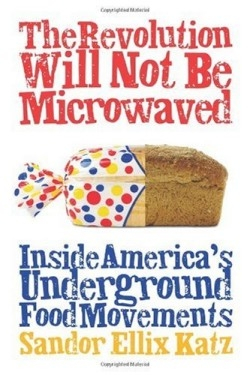The Revolution Will Not Be Microwaved
Inside America's Underground Food Movements
The Revolution Will Not Be Microwaved is a book that could change lives. A reader who already flirts with the idea of food as political action by, for example, not eating meat or boycotting the fast food chain KFC because of its animal rights record, could soon find herself dumpster-diving to reclaim viable produce to feed the hungry, buying raw milk from dairy farmers (probably illegal), or swapping seeds with other produce growers (also possibly illegal).
Katz is the author of the food how-to book, Wild Fermentation, about nurturing and preparing live-culture foods, but in his newest work he is much more interested in fermenting rebellion against Big Food, the multinational corporations that, with the assistance of lawmakers, are increasingly controlling how and what we eat. Katz takes his title, of course, from Gil Scott-Heron’s 1970’s musical performance piece about racial injustice and social upheaval. The focus may be different, but the sentiment and energy are the same.
The power of this book lies with Katz’s ability to demonstrate in clear and compelling language the powerful international and political forces that affect what ends up on our dining room tables. For example, Katz points out that more than half of the world’s commercial seed supply is controlled by just a few companies. In the twenty-first century, many of the seeds produced by these companies are genetically modified in some way and are patent protected. As a result, farmers who follow ancient traditions such as sharing seeds with other farmers have been legally prosecuted. The Canadian Supreme Court even upheld the conviction of a farmer not for sharing his seed, but just for saving seeds from his crops for his own use. Legislative protection of seed companies’ profits at the expense of farmers may not be needed for long, however. Katz points out that the seed industry has developed “terminator” technology, “seeds that generate self-sterilizing plants.” If put into widespread use, farmers would have no choice but to purchase next year’s seeds rather than saving them from this year’s crop, thereby ending a practice that has fed humanity since the beginning of agriculture.
Throughout the book, Katz reveals the intersection of food and politics, and then highlights grassroots movements that are fighting back. “The raw-milk underground,” he writes, “is one of the most widespread civil disobedience movements in the United States today.” Along the way, he introduces the reader to a host of interesting characters, such as Terra, the “roadkill radical” and editor of The Feral Forager newsletter whose boyfriend had the word “vegan” tattooed on his shin before being converted to the culinary delights of animals killed by automobiles. Most of the forms of food activism are more palatable than Terra’s, though, and Katz guides the reader through an underground community of people who are buying and drinking unpasteurized apple cider and milk, selling bread baked in uninspected home kitchens, making deals with grocery stores to use food that cannot be sold to feed the hungry, and growing their own food on unused city plots. It’s a fascinating group of lawbreakers.
The Revolution Will Not Be Microwaved should be displayed (and sold) alongside Fast Food Nation, Super Size Me, and other national bestsellers—its message is just as important.
Disclosure: This article is not an endorsement, but a review. The publisher of this book provided free copies of the book to have their book reviewed by a professional reviewer. No fee was paid by the publisher for this review. Foreword Reviews only recommends books that we love. Foreword Magazine, Inc. is disclosing this in accordance with the Federal Trade Commission’s 16 CFR, Part 255.


